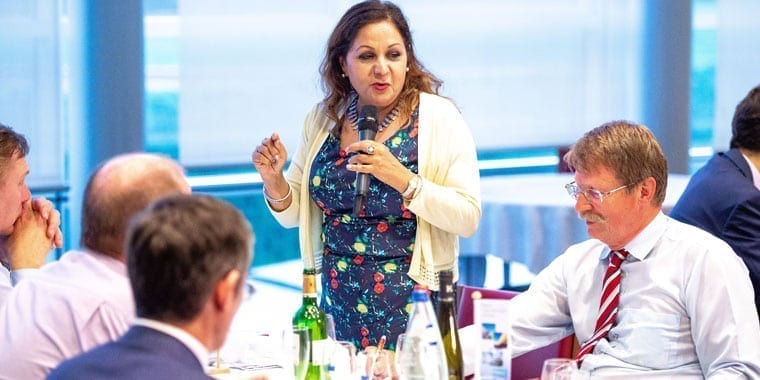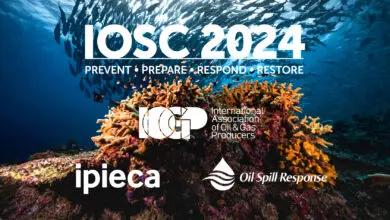
European Parliament dinner: industry future on the menu
Members of the European Parliament (MEPs) from the full spectrum of political parties, including environmentalists, attended the European Energy Forum dinner hosted by IOGP on May 29.
The seat of the European Parliament in Strasbourg, France, was the venue for the dinner, with IOGP Director of European Affairs François-Régis Mouton as main speaker for the evening.
The dinner covered a variety of oil and gas topics relevant to European legislators as they ponder the European Union’s continuing aspirations to a low carbon energy future consistent with the goals established by the Paris agreement. Parliament is working in parallel with other European Institutions on energy efficiency and renewables targets for 2030, and will discuss the EU’s Long-Term Energy & Climate Strategy for 2050 in the coming months.
MEPs were therefore eager to hear from the industry what role oil and gas – which currently account for 57% of the EU’s primary energy demand – would have in such a low-emission future.
Setting the scene overall, European Energy Forum Chair and MEP Jerzy Buzek stressed the importance and timeliness of the dinner debate. “Our economy, today, cannot work without oil and gas. I’m curious to see how the industry sees this evolve in the future,” he said.
A featured speaker at the dinner was Rob James, Oil Spill Response Limited’s Regional Director for EMEA. His presentation was pertinent to the launch this year of the European Commission’s review of the Offshore Safety Directive. “The industry puts a lot of resources in being prepared so that an incident doesn’t become a crisis,” Rob told participants.
Challenges into opportunities
François-Régis went on to explain that that challenges to bring about a low-emission European economy actually provide new opportunities for the oil and gas industry.
In addition to the measures the industry would take to reduce its own environmental footprint, he cited collaboration with other industries to support their own transitions. These opportunities include:
- Switching from coal to gas in power generation
- Supplying low-emission liquid fuels, hydrogen, LNG and compressed natural gas in road, air, and maritime transport
- Supplying oil and gas as non-burnable feedstock for petrochemicals
- Supporting future-oriented technologies such as carbon capture use & storage (CCUS) and in the longer term, gas-to-hydrogen conversion
- Making a low-emission electric system resilient with flexible gas plants and infrastructure
Moreover, François-Régis said, oil and gas can be instrumental in making the move to Europe’s low-emissions economy more affordable, especially compared to the full-electrification of society, often touted as the silver bullet.
Doing so would help to retain and strengthen the EU’s industrial base with an indigenous supply of affordable energy. An energy future that includes oil and gas would also help to frame consumer-friendly policies that would tackle energy poverty. ‘In the EU, gas is four times more affordable per kilowatt hour than electricity,” François-Régis reminded the audience. Supporting economy wide cost-efficient policies such as carbon pricing and expanded research into concepts including natural gas-to-hydrogen would also advance lower carbon objectives, he said.
Encouraging levels of reserves
Fortunately, the legislators learned, there are ample reserves of European oil and gas. Citing research from Wood Mackenzie, François-Régis referred to over 5,100 billion cubic metres of remaining indigenous gas resources, covering half of EU gas demand for another 25 years. Similarly, 32 billion barrels of recoverable oil could sustain current production levels for another 15-25 years, he said. Continuing development, however, will rely on “responsive fiscal frameworks and strong cooperation between regulators and industry, as well as the completion of an internal energy market that will facilitate efficient recovery of European oil and gas.”
Drilling prospects support these figures. Between now and 2025, the industry plans to spend around US$60 billion in European exploration, representing 20% of global exploration expenditure. In exchanges with MEPs, François-Régis said: “The EU is about to review its long-term climate strategy for 2050. It was important for our industry to be here and explain the role of oil and gas in a low-emissions future.”
Commenting on the event, François-Régis noted that: “It was particularly gratifying to have active and construction participation in our discussions from a broad cross section of parliamentary views. Participants showed a clear interest in hearing what we had to say about the future role of oil and gas and the ways in which we will adapt to stay within the EU’s carbon budget. MEPs challenged us, but none came to say that they opposed oil and gas no matter what; instead, they focused on the need – with which our industry agrees – to control emissions.”



